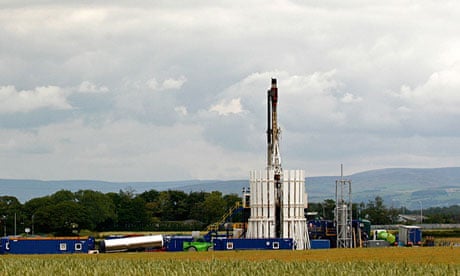The government's campaign to kickstart a shale gas revolution in Britain received a major boost on Thursday when Centrica joined in by promising to spend up to £160m on a key licence near Blackpool.
The UK's biggest domestic energy supplier and parent of British Gas has paid what some in the City believed a "surprisingly high" price for its 25% stake in the Bowland basin held by smaller pioneers Cuadrilla Resources and AJ Lucas.
It means Sam Laidlaw, the Centrica boss, and Lord Browne, a Cuadrilla director, two of the UK's most prominent businessmen and both with close links to ministers, are now spearheading a fracking industry that still faces significant hurdles in proving the extent of genuine reserves and reassuring the public over safety.
Michael Fallon, the energy minister working with the Treasury on a new tax regime for fracking, said Centrica's expertise in the energy sector as an operator and developer was a big step forward for shale in Britain. "Their investment is a vote of confidence in the significant efforts this government has made to create the right environment to accelerate the development of shale in a responsible way," he said.
Centrica, which as recently as January played down hopes that Britain could replicate the dramatic reduction in gas prices seen over the past two years in America through shale, said it made sense to get involved now.
"With North Sea gas reserves declining and the UK becoming more dependent on imported gas, it is important that we look for opportunities to develop domestic gas resources, to provide affordable sources of gas to our customers, and to deliver broader economic benefits to the UK," said Mark Hanafin, managing director of Centrica's international exploration and production business.
But equity analysts expressed surprise that Centrica had been willing to pay what amounted to $3,000 an acre at Bowland, compared with $5,000 for proven shale areas in the US. "The involvement of Centrica is enough to raise the profile of the UK shale gas sector. But it is a surprisingly high price considering no shale gas is flowing yet in this country and only a few wells drilled. Either they know something we don't, or they are taking a major punt," said one top energy analyst who asked not to be named.
Meanwhile, environmentalists warned that Centrica was taking "a really big risk" by throwing itself into a controversial fossil fuel sector that they believe will only make climate change worse.
Jenny Banks, climate and energy specialist at WWF-UK, said: "Centrica has already singled itself out as a target for Greenpeace and others for not taking climate change seriously in the investments it makes. But this also has economic risks around getting gas out of the ground and environmental risks around accidents."
The Bowland licence is operated by Cuadrilla, with three exploration wells drilled to date. Centrica said data obtained from the drilling process had confirmed the presence of natural gas.
The gas company added that initial work suggested there could be 200tn cubic feet of gas in place relating to the Bowland shale licence, although it warned: "Further drilling will be required to establish whether the discovery is commercial."
A report, Britain's Shale Gas Potential, published last month by the Institute of Directors, estimated that locally produced shale could reduce the proportion of gas the UK has to import in 2030 from 76% to 37%. UK-wide investment could reach £3.7bn a year, supporting 74,000 jobs across the industry and its supply chain, the report said.
The discovery in the US of huge amounts of shale as a result of using new techniques such as horizontal drilling and "fracking" the rock using chemicals has led to a huge new shale industry that sent prices of natural gas plummeting from above $10 per million British thermal units to below $3 and turned the country from a gas importer to a potential exporter.
Shale is also helping to revitalise a previously troubled manufacturing sector in the US by allowing cheap energy to drastically reduce the cost per unit of US factories, supporters claim.
But Centrica insisted in January that shale gas was not "the game-changer we've seen in North America" and played down speculation that it might start drilling. Some have speculated that the change of heart is associated with Centrica fearing it could "miss the boat" if shale took off in this country but others question whether the company is deliberately currying favour with government.
Last week IGas, a competitor of Cuadrilla, which had previously said it was sitting on 9tn cubic feet of shale gas reserves, said new estimates suggested the volume of "gas initially in place" could range from 15.1tn cubic feet to 172.3tn cubic feet. IGas is also talking to larger outside investors about selling a stake. The names of Shell, BG and Statoil have all been trailed by analysts as potential new shale entrants.
